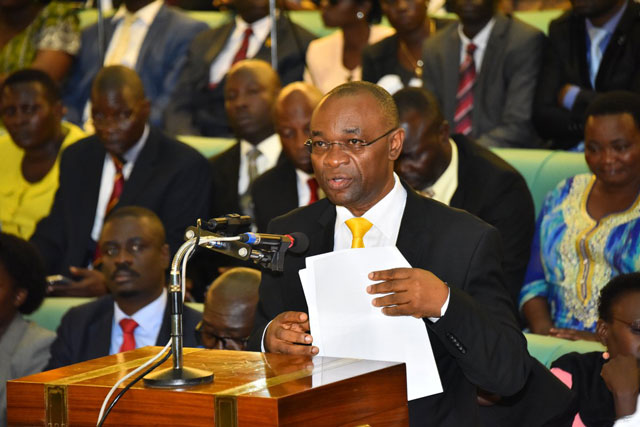
The claim that proposed amendment is unconstitutional is peppered with misrepresentation
COMMENT | Stuart Oramire | As an ardent reader of senior counsel and citizen, Peter Mulira’s articles, I keenly read the opinion he authored in the Daily Monitor newspaper of October 17, 2017 titled `Constitution should not be tampered with by politicians’. Although he offered wise counsel as he normally does, his commentary was peppered with political and legal misrepresentations.
Firstly, Mulira falsely claims that many people have opted out of the presidential age-limit debate and the fate of the country is now in the hands of Members of Parliament. This is a misleading claim. Currently, there are ongoing nationwide consultations and people are actively airing their views. In fact, Mulira even writes about the now prominent news of senior citizens who spoke at a workshop that was organised by the Elders Forum recently. These events do not seem to discount public interest and involvement in the current debate although, ultimately, Parliament retains the constitutional mandate to amend Article 102(b).
Mulira seems to draw a clear distinction between constitutional matters and political issues. Whereas I agree with the senior counsel that a national Constitution should be, somehow, above politics, one cannot divorce constitutional matters from political issues. The politics of any country is a function of her Constitutional and legal framework. This is because, by definition, a Constitution is the fundamental law from which all organs of the state derive their legitimacy. The constitution concerns itself with the acquisition and methods of distribution of power. So how can such a law be, at the very least, distanced or divorced from politics?
Mulira’s main point of contention is that the Bill to amend Article 102(b) is unconstitutional because it was introduced by a private member according to rules that govern political work of Parliament, and therefore there is need to enact a law implementing the provision of Chapter Eighteen and making rules under that law providing for procedure for such amendment. Here Mulira misses a number of points.
Firstly, he rightly acknowledges that Parliament is given power under Article 94 to make rules to regulate its procedure and Article 94(4)(b) specifically gives a Member of Parliament the right to move a Private Member’s Bill subject to certain limitations. These rules are not limited in their scope of application.
Mulira incorrectly claims that the Constitution makes a distinction between the political work of Parliament and its special powers to amend the Constitution. Although the cardinal role of Parliament is its legislative function as provided for under Article 79, the same Parliament can, among its other roles, also amend the Constitution as Mulira rightly points out. However, to better understand how Parliament plays its various functions, one must use the rule of interpretation that a constitution must be read as a whole and not in part as senior counsel expediently does. For example, the distinction Mulira draws between Articles 79 and 259 is blurred by Article 79(3) that provides Parliament with the duty to protect the constitution and promote the democratic governance of Uganda. This clause envisages the correlation and dual function of parliament in its legislative role and amendment of the constitution.
Secondly, Article 259 that Mulira keeps referring to cannot be read in isolation of other provisions of the Constitution. Article 259 (1) provides that, subject to other provisions of this constitution, Parliament may amend by way of addition, variation or repeal, any provision of this constitution in accordance with the procedure laid down in this chapter. The implication of this is that Article 259 must be read and interpreted together with, and not in isolation of, Article 79 and specifically subsection (3), Article 94 on Rules of procedure in Parliament and Article 262 among others.
However for political expediency, Mulira interpreted these provisions differently with a purpose of creating procedural frailties. Mulira goes further to claim that chapter eighteen does not confer on a private member the right to move a Bill to amend the constitution but he does not provide a single provision under the same chapter that expressly fortifies his incorrect claim.
Mulira is right where he quotes Article 94(4)(b) which specifically gives a Member of Parliament the right to move a Private Member’s Bill subject to the prior assistance of the department of government whose area of operation is affected by the Bill and the involvement of both the Parliamentary Counsel and the Attorney General’s office in drafting of the Bill.
As far as I know, some of these procedural requirements have been complied with the same way the requirement of a certificate of the speaker before the Presidential assent to the Bill shall be complied with at the right time as provided under Article 263(2)(a).
Lastly it is well known that a Constitution is made up of broad provisions and, more often, these provisions are interpreted differently even though there are various rules of interpretation of the Constitution. Therefore, Article 137 of the same constitution provides for recourse to the constitutional court on any questions as to the interpretation of the constitution. At times, rather than cause public excitement, this can be a better option. Precedents of successful constitutional petitions abound in Uganda.
****

Stuart Oramire is a Constitutional Law Scholar and Researcher.
stuartoramire@yahoo.com
 The Independent Uganda: You get the Truth we Pay the Price
The Independent Uganda: You get the Truth we Pay the Price


